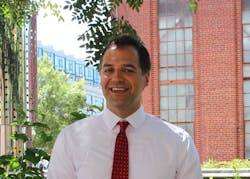2016 Top 40 Under 40: Benjamin Owen
Benjamin Owen
Community Planner
Federal Transit Administration
- One Word to Describe Yourself: Earnest
- Alma Mater: Grinnell College, University of North Carolina at Chapel Hill
- Favorite TV Show: “Breaking Bad”
- Favorite Movie: “Fargo”
- Favorite Hobbies: Exploring cities (especially far-flung ones), bicycling, cooking
- Fun Fact: He's never owned a car
- Favorite Transit System (other than one they work at): BVG, Berlin, Germany. He lived in Berlin for a few months during college and his experience using the system inspired him to work in transit — it was efficient, extensive and a really integral part of the city. Their marketing and communications were also great — clear, informative and good-humored.
Benjamin Owen has worked at the Federal Transit Administration (FTA) since he started as a presidential management fellow in 2010 in the FTA’s Office of Planning and Environment. The program requires an assignment and Owen chose to do his assignment at Embarq, World Resources Center, researching several national governments and how they structure funding programs for major mass transit projects to identify the state of the practice around the world and best practices in approaches that offered clear guidance. He co-authored a report and was able to bring that context back to the FTA as they work to ensure the guidance is clear in what they’re seeking from agencies.
His transit background has given him an understanding of what the agencies face. His first job in transit was doing transit service planning for Pace Suburban Bus in the Chicago suburbs. While there he worked on a project restructuring all of the service in the south and southwest suburbs; 40 percent of Pace service and about 80 municipalities. That meaningful project delivered a service that was more reliable to meet the current ridership demands.
Currently Owen manages the FTA’s Office of Planning and Environment planning contracts that enable the FTA to evaluate and rate proposed projects under the statutorily required project justification measures for land use and economic development. He’s the team lead for projects in the Chicago-Twin Cities area, working with interdisciplinary teams to ensure projects that are seeking funding through the program are meeting policy and legal requirements, and also providing project sponsors with timely, accurate guidance about the program, evaluating projects and assessing a project’s readiness for construction.
Owen’s contributions in recent years to these programs have significantly helped FTA improve its management of the program. He has provided insights on policy and procedural matters, performed thorough research and analytical analyses to inform decision-making.
Owen manages the office’s planning contracts that enable the FTA to evaluate and rate proposed projects under the statutorily required project justification measures for land use and economic development. He has been instrumental in helping define and implement the current evaluation measures for land use and economic development.
Owen performed extensive research to inform FTA’s New Starts and Small Starts final rule published in 2013, and the Final Interim Policy Guidance published in 2015. Both of these were top priorities for FTA.
Working collaboratively with other offices in FTA, Owen also developed updated and improved data reporting instructions, templates, and cost reporting worksheets that project sponsors must use when submitting information to FTA for consideration. These electronic tools he developed simplify the reporting process and ease the burden on project sponsors to a great extent since they utilize simple drop down menus and interlocking sheets that require data input only once rather than multiple times.
In addition to these significant contributions made to improving and streamlining the Capital Investment Grant program, Mr. Owen successfully manages FTA’s Pilot Program for Transit Oriented Development (TOD) Planning.
“There’s a lot to manage. We have a lot more going on at FTA then what people realize we do in terms of the amount of work and the support it takes to keep things going, especially something like the CIG program, we’re making the funding decisions at the national level and there’s a really elaborate policy framework of support that goes along with that.”
“It’s really good to have the perspective of having worked at an agency … to have a sense of what transit agencies do on a day-to-day basis … I think about that when it comes to refining the capital investment grant program evaluation program criteria. What data do transit agencies actually have, that’s readily available to them so we’re not making them jump through all sorts of new hoops to report information to us.”
“I think one of the challenges we face a lot is that we have to come up with policy that applies across the country to a lot of different contexts … a lot of times the comments are really specific to conditions in certain regions and I think a lot of agencies think they have the approach that works well and for their region … but ultimately you have to work for everyone and it may not be ideal for everyone. I think sometimes agencies get frustrated that we don’t implement exactly what it is they think we should do and a lot of times it has to do with how transferable it is or how easy it would be for other agencies to copy that approach they have in mind.”
